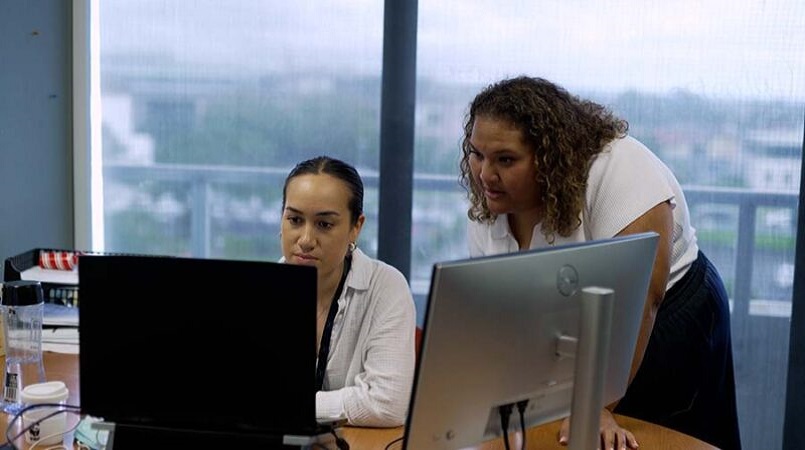
Menstrual and Menopause leave is nothing new, and its genesis goes back to last century.
And while workplaces around the world have introduced these policies into their own sites, here in Aotearoa Pacific Media Network (PMN) is the first company to institute Menopause and Menstrual paid leave.
It comes after the union members of the organisation held a meeting to discuss what they wanted to change about their work conditions.
The suggestion was made by a few of the network’s on-air announcers who were discussing period-related topics on their show.
“A family member of one of our coworkers happened to be listening and they were like, ‘what does your workspace do about supporting women when they’re going through that time of the month, or anything menopause related?’”, recalls PMN Union Delegate Lusia Petelo.
“We then had to figure out, okay this is the claim the team want us to take,” she says.
“How do we present it to management to be like, ‘hey, we would like to have a leave introduced for menopause or period related leave.’?”
Supported by her fellow delegates, Petelo presented the claim to management.
PMN Ceo Don Mann said he supported the policy, but felt that a radio station shouldn’t take the lead, “I couldn’t find anything in Aotearoa,” Mann remembers.
Both parties conducted their own research into the matter, Petelo spoke with the company’s female staff to get their perspective and experiences.
Mann reached out to Australian company Modibodi who, last year, instituted menstrual, menopause and miscarriage paid leave.
“I went back to Lusia and I said, ‘shouldn’t an organisation, one that’s centered on women’s issues, if there was a Ministry for Women, that an organisation like that should lead the charge on it, as opposed to us?’”
To Petelo’s immense disappointment, the claim was initially rejected, “I cannot believe it’s something we have to fight for.”
“It’s natural, it’s a natural part of being human.”
Many online commentators have debated the validity of having menstrual and menopause leave, arguing that it only further encourages gender disparity in the workplace.
But with symptoms such as brain fog, cramping, heavy bleeding, hot flashes, low mood and migraines – many women find they can’t operate at full capacity.
A UK study released this year found that a third of women missed work due to menopause symptoms.
And over in the Netherlands, where over 32,000 Dutch women took part in a menstrual study, 80% of them continued to work even when they felt unwell.
This led to less productivity in the workplace and resulted in a loss of 9 days of productivity per year.
Petelo wasn’t willing to let the claim go and came back to Mann, “I’m not gonna lie, I sat in that room just realizing like, I am speaking on behalf of so many women and every single person, their journey is different.”
“As a brand here at PMN, people know that we have PMN News, 531 PI and Niu FM,” says Petelo, who also works as an on-air announcer.
“We share everybody’s stories from all around the world. If we are sharing other people’s information or news on our platform, why are we not standing to make our own change within our own workplace and walk our talk?”
“Lusia is brave, she’s courageous, she’s an incredible leader,” says Mann.
“She stands up for what she believes in, she’s highly intelligent.”
After careful consideration, the claim was finally approved. The female union members of PMN are guaranteed 12 days of paid menstrual and menopause leave.
The network also provides free sanitary products in the women’s bathroom.
“I realized at the end of the day, like this has a huge impact on just women overall, um, in the world really,” enthuses Petelo.
“The impact of it on me personally has been huge and I’m so grateful not only to management, but my union delegate team because they made the journey a lot more easier.”
And while such a policy will continue to have its fair share of naysayers, Mann has this to say, “perhaps policies like this inadvertently result in organisations not employing women.”
“If there’s an organisation thinking that way, well they’re not an organisation that anyone should be working for in the first place,” he says.
“The main thing is that people can bring things to myself, or the management team and we can talk about things openly in a really safe way.”
